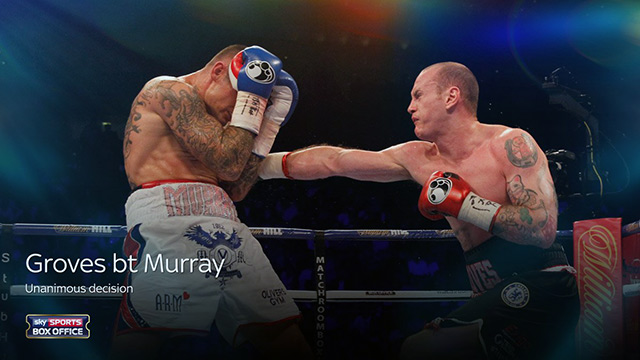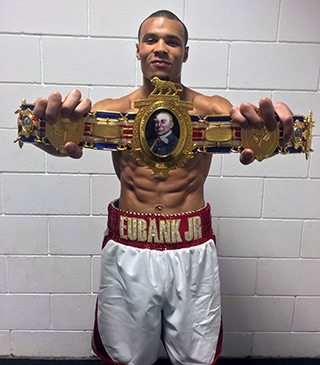George Groves, Chris Eubank Jr. win on Joshua-Breazeale undercard


Photo / graphic courtesy of @SkySportsBoxing
LONDON – In a fight of two halves between two perennial world title challengers, George Groves bagged a unanimous decision win over fellow Brit Martin Murray by three scores of 118-110 this evening at O2 Arena.
Deemed a make-or-break clash beforehand, both Groves and Murray showed a bit of everything that had taken them to a combined seven world title challenges – the good, the bad and the ugly – and produced six rounds of cute boxing followed by six rounds of all-out mayhem.
It began in an orderly fashion. Groves, blessed with one of the finest jabs in British boxing, claimed the centre of the ring, a position automatically surrendered by Murray, and used his pet punch to move his opponent around the perimeter. There were body shots to follow. But the spite was noticeably turned down.
At first, Murray did little. His plan, clever if not exactly groundbreaking, was to safely negotiate his way through the opening rounds, hoping Groves’ anxiety and desire for a quick finish would cause him to waste precious energy, and then come on strong in the later rounds. Alas, Groves was as wise to this plan as the rest of us, so was content to stalk and use power shots only sparingly.
Cautious Murray cleared his throat with a left hook to the body in round three, which winded Groves and caused him to hold, and then started to converse freely and openly from round four onwards, attacking more, throwing more, engaging more.
Yet, the more Murray opened up, the more Groves was able to find holes in a once tough to penetrate defence. A right hand in the sixth, for example, which momentarily stunned Murray, simply wasn’t there in rounds one and two. Nor, for that matter, was the mammoth right uppercut Groves bounced off Murray’s jaw in the closing stages of round seven, a single shot which changed the pattern of the fight and essentially triggered a dramatic surge in action (admittedly, had the shot arrived thirty seconds earlier there would have been no need for round eight, let alone further action, such was the severe impact it had on Murray).
Groves, 28, had by now loosened up, either through design or tiredness, and appeared keen to capitalise on his big shot in round seven. He marched after Murray, legs still flimsy, and uncorked a number of right crosses and left hooks, all of them serving to heighten Murray’s sense of panic and need to escape. He tried to do so, to escape, more than once, but each time his legs only conspired to take him from one corner of the ring to another. Then Groves would reappear. Then body shots followed head shots. Now spite was encouraged not stifled.
Still, Murray survived the round, testament to his toughness, and was out again for the ninth. Somehow in this round he seemed a little fresher, too, as if having gained something from Groves’ inability to finish him, but then a nasty right hand connected on his chin in the closing stages and he now found himself in an even worse state than before; his journey back to his stool was becoming increasingly complex with each right hand taken flush.
It was at this point the fight seemed as good as over. Indeed, Murray’s trainer, Oliver Harrison, seemed to be having that discussion with his man in between rounds.
But then the 10th came along and Harrison’s instinct proved correct. Murray (33-4-1, 16 knockouts) walking wounded, gave it one last go, miraculously landed his best shot of the fight, a right hand in a frantic shootout, and now it was Groves with the ringing ears, the double vision and the need to seek refuge in a series of clinches. It was his legs which were now uncertain. It was his career suddenly on the line.
Groves, like Murray, tried to ride it out. He called on experience, as well as growing maturity, to tie up Murray when necessary, stall the clock and generally outbox his smaller foe behind a more consistent jab and far better variety. His was always the cleaner work and his power continued to be a momentum-shifter; just when Murray appeared to be coming on, he’d be humbled by something heavy coming back.
The 12th was a microcosm of all this as Murray huffed and puffed, aimlessly looked for a pay-off shot, the equaliser, but was then badly hurt by counter-punches whenever Groves spotted an opening and sought to silence him. Cue scenes of them both loading up and simultaneously unleashing right hands as though pitching fast balls. It made for quite the grandstand finish.
In the end, though, history told us it would happen this way. History told us Groves (24-3, 18 KOs) was the harder-hitting, more athletic and busier boxer. It told us he had his peaks and troughs, his moments of brilliance, his moments of vulnerability. It told us he was the natural super-middleweight. And so it proved. Murray, meanwhile, showed the kind of doggedness which has helped him become a reliable middleweight title challenger over the years. He soaked up whatever was thrown at him, he boxed with intelligence, and he displayed an innate ability to stick around when the going got tough. But, ultimately, he wasn’t in Groves’ league.
 Chris Eubank Jr. did exactly what was expected of him this evening at London’s O2 Arena, stopping Welshman Tom Doran inside four rounds in defence of his British middleweight title.
Chris Eubank Jr. did exactly what was expected of him this evening at London’s O2 Arena, stopping Welshman Tom Doran inside four rounds in defence of his British middleweight title.
The Brighton man, competing for the first time since injuring former British champion Nick Blackwell in March, rattled through his repertoire, mixing in searing uppercuts, wild hooks and curious poses, before dropping Doran three times in round four and breaking his heart.
In the first couple of rounds, though, the contest threatened to be more competitive than many expected. Plucky Doran, the slightly shorter man, made it his mission to counter every Eubank Jr. attack with a left hook of his own and, by backing himself in this way, found the champion a surprisingly easy target to hit. Often off balance, Eubank Jr. was made to look clumsy on occasion.
But that was about as good as it got for the challenger. Soon enough Eubank Jr found his timing and was dicing Doran up with uppercuts and tight hooks in close. A flurry in round three shook him, prompting Eubank Jr. to pounce, and gone was the intrigue whenever they traded shots. Now it was clear who possessed the greater firepower.
Doran (17-1, 7 KOs) survived the third but not much longer. His resistance had been cracked and Eubank Jr., having exorcised all lingering demons from March, set about his wounded prey with violent intent. Right uppercut after right uppercut did the job, the eventual submission a relief to all.
Talk of Eubank Jr. (23-1, 17 KOs) fighting Gennady Golovkin this autumn rages on. It makes money, it’s a marketable event (on British soil) and Golovkin isn’t exactly spoilt with options. Frankly, Eubank Jr. should be commended for actively pursuing a man many refuse to so much as acknowledge. But, before the hype is cranked up and the fight gets made, it’s worth contemplating for a moment what a man like Golovkin would do to British title challengers of Doran’s ilk. It certainly wouldn’t be competitive, not even for a round or two, and it wouldn’t be very pretty, either.















